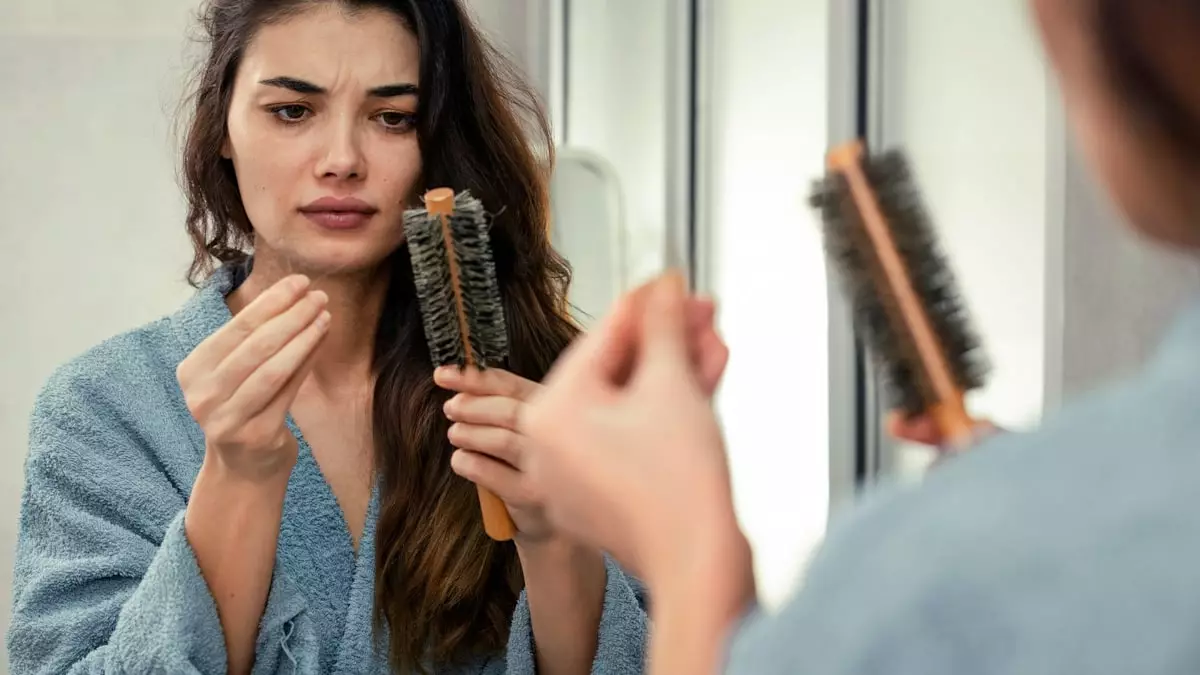In recent months, weight loss medications like Mounjaro have emerged as a game-changer for those struggling with obesity and related health issues. However, an unsettling concern is accompanying this buzz—hair loss. A staggering 250% increase in online searches for “Mounjaro hair” highlights a growing unease among users. Platforms like TikTok are overflowing with testimonials from individuals reporting distressing hair thinning after starting the drug. While anecdotal evidence doesn’t present a definitive cause-and-effect relationship, it signals a need for closer examination of this unintended consequence.
Studies indicate that although Mounjaro—an injectable glucagon-like peptide-1 (GLP-1) receptor agonist—isn’t directly responsible for hair loss, it may create an environment conducive to it. Rapid weight reduction, a common side effect of Mounjaro, can instigate a physiological stress response. In this state of stress, the body recalibrates its priorities, channeling energy toward fundamental functions and straying from non-critical processes such as hair growth. This results in more hair follicles than usual transitioning into a dormant phase, which leads to increased shedding and thinning.
Nutritional Deficiencies: A Hidden Culprit
Another critical factor contributing to hair loss in Mounjaro users is the altered appetite that accompanies the medication. While appetite suppression can aid in weight reduction, it may inadvertently lead to nutrient deficiencies. Essential vitamins and minerals like protein, iron, and fatty acids are vital for maintaining healthy hair growth. Users might find themselves consuming fewer of these nutrients, which could precipitate hair weakness or loss.
Specifically, adequate protein intake is paramount, as hair is primarily composed of keratin, a protein dense in amino acids. Incorporating a variety of high-quality protein sources such as chicken, fish, legumes, and dairy can fortify hair health. Moreover, healthy fats play an enormous role in hormonal regulation—crucial for hair vitality. Foods like avocados and nuts should be staples in a Mounjaro user’s diet to combat potential hormonal imbalances that can affect hair health.
Understanding Stress and Sleep: The Overlooked Variables
The intersection of weight loss, medication, and stress is intricate. Although Mounjaro itself isn’t a stress-inducing drug, the lifestyle changes that accompany its use often introduce new stressors. Heightened cortisol levels from stress can adversely affect the hair growth cycle. Within this context, the significance of proper sleep cannot be overstated. Sleep-related regeneration of tissue and hormone balancing are critical to overall health.
Aiming for 7 to 9 hours of restorative sleep is essential for those undergoing weight loss with Mounjaro. Beyond sheer quantity, the quality of sleep impacts recovery and hair health. Incorporating stress-management techniques such as meditation and yoga can also work wonders in mitigating hair loss risk. In essence, creating a balanced lifestyle—physically and mentally—is crucial.
Hydration and Scalp Health: Beyond the Surface
Dehydration poses another risk, especially for Mounjaro users, as the medication may dampen thirst cues. Consequently, insufficient water intake can severely impact circulation to the scalp, limiting the delivery of oxygen and nutrients essential for hair follicle health. Striving for a hydration target of 1.5 to 2 liters per day is an ideal goal. Additionally, considering electrolyte incorporation—through foods like bananas and spinach—can further enhance hydration and nutrient absorption.
Hair health is inextricably linked to collagen production, an essential protein that keeps hair strong and skin elastic. Age, stress, and dietary deficiencies can hinder collagen synthesis; hence, incorporating collagen-boosting foods such as citrus fruits, leafy greens, and even bone broth can support hair vitality. For quicker results, collagen supplements may provide a helpful addition to one’s health regimen.
Revolutionary Treatments: A New Hope for Hair Loss
As the dialogue around female hair loss evolves, innovative treatments are emerging that address the specific needs of individuals experiencing this challenge. One such advancement is RF microneedling, a non-invasive procedure that combines radiofrequency technology with exosome therapy to enhance scalp circulation and stimulate dormant hair follicles. By delivering vital proteins and nucleic acids directly to the scalp, these treatments can awaken sluggish hair growth, addressing the concerns of many women grappling with hair loss.
Boris Hodakel, founder of We Are Feel, highlights the inadequacy of long-standing stereotypes surrounding hair loss. Hay loss is not a “male problem” alone; nearly 40% of women face it at some stage in their lives. Yet, their distress is frequently minimized. This growing awareness heralds a shift in the narrative, urging society to pay attention to the emotional toll of hair loss, especially among women.
While weight loss medications like Mounjaro may offer significant health benefits, it’s imperative that users maintain a holistic approach to their well-being. By prioritizing nutrition, managing stress, ensuring hydration, and exploring emerging treatments, individuals can navigate the complexities of their hair health reclaiming their self-esteem in the process.


Leave a Reply